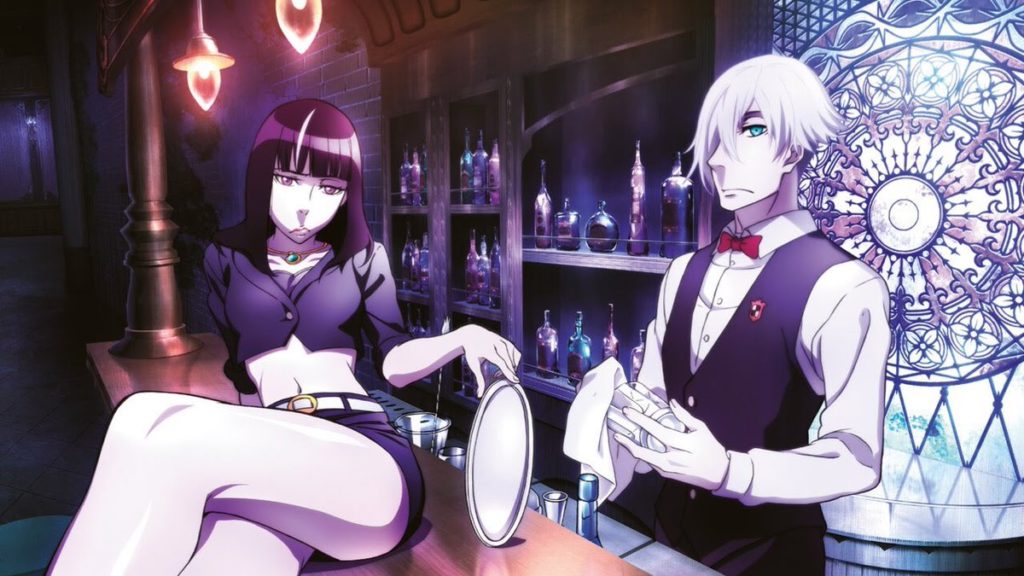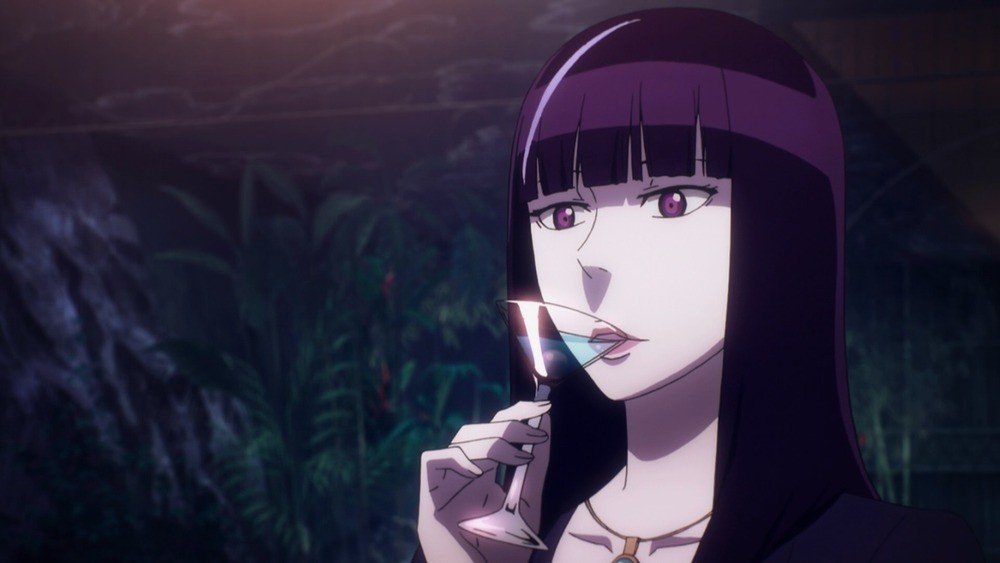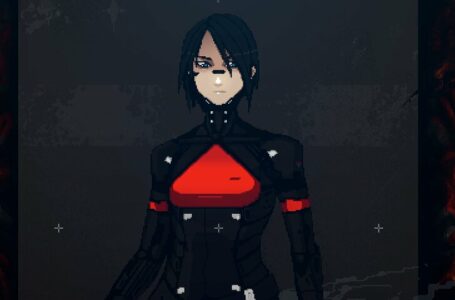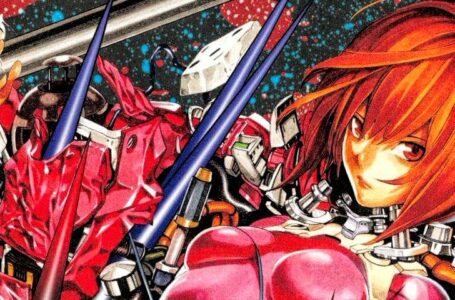Waifu Wednesday: The Black-Haired Woman (Death Parade)
Ah, Black-Haired Woman, how I love thee.
Considering how much I adored Death Parade when it initially aired back in 2015, I surprised myself when I looked back over the Rice Digital archives — I haven’t written anything about it yet!
But the much-needed coverage on its greatness is better late than never, and since former staffer Oscar TK discussed it around the time of its airing, I want to remember it once more for the valuable lifelong lessons it left its audiences with five years ago — something we never touched upon after it wrapped up.
Death Parade was a show that was expanded from the short film Death Billiards which — no surprise considering its name — depicted two men playing a life-or-death game of billiards. The Death Parade series featured just 12 episodes, but managed to lay the groundwork for a relatable but challenging psychological thriller that explored heavy themes of morality — and the many complications that come with simply existing.
And nowhere is this better presented within the show than through its leading lady, the Black-Haired Woman.
Spoilers and potentially triggering subjects ahead where bolded text appears.
Who is the Black-Haired Woman?
For spoilers’ sake, we will not immediately mention her actual name, since it’s not until later in the show that it is revealed — and this fact in itself shows just how little we’re supposed to know about her when going into the anime.
As pictured below, she is the assistant to the main character Decim, a bartender who works in the Quindecim bar. The bar acts as a form of purgatory, where deceased individuals are paired up according to when they passed on, and they are tested in a randomly selected game to have their true character judged by an arbiter of death. Based on their memories, their behaviour, and the consequences of the match’s result, the arbiter decides who will be reincarnated, and who will be sent to oblivion.
The Black-Haired Woman arrives the same way every other individual does in the lift, but as an amnesiac whose background and identity is as mysterious as every other element of the show, the gradual unmasking of who the Black-Haired Woman is starts and ends the Death Parade journey.
She is in the driver’s seat of progressing the narrative as her self-discovery takes precedence over the many side characters we barely get to see established over the course of the show’s episodic structure — and this is all for the sake of representing the significant lessons she has taken to heart by the time she retains her memories, finally learning and appreciating what living truly means.
Why we love the Black-Haired Woman

Spoilers start here.
The Black-Haired Woman’s appeal is not only in her character design — I admit, I wouldn’t fault anyone for falling for the eye-catching promotional art seen above — but for the depth of exploration she alone received in the show. While Death Parade frequently disappointed in never quite explaining nor exploring quite enough of its world, characters and story to be truly satisfying, the origin story and character development of the Black-Haired Woman is what has stayed with me since first watching the show.
The Black-Haired Woman, or Chiyuki as her name is later revealed to be, lived life as a talented ice-skater, until she injured her knee beyond recovery, resulting in her inability to ever indulge in her passion ever again for the rest of her life. Having fallen into a deep depression, she committed suicide.
While this revelation comes all too abruptly in the 11th episode as a means of fleshing out the only character who has been explored in this much depth over the course of the show, Chiyuki ends up representing Death Parade’s core themes and messages very nicely through her personal journey of self-acceptance and final epiphany.
Chiyuki’s story is ultimately a cautionary tale against going through life according to what is expected of you, and of allowing a single thing to define you so much that it translates to your sole reason for existence. This is no way of living — once that very element which makes you feel significant and determines your “value” in your own eyes is forcibly stripped away from you, what else is left?
In Chiyuki’s case, it resulted in the inability to see value in everything else that represented her life. She distanced herself so much from loved ones that she ended up believing that no-one would ever truly understand her. She stripped those who cared about her of the opportunity for closure, and ultimately inflicted grief upon them through her decision — and she is painfully aware of all this by the time she comes to recall her past life.
While her realisation comes much too late for her, it remains as a constant remainder to everyone watching that we still have chances to change our perception of life and humanity, and there’s always a better way to deal with life than simply giving up.
Spoilers end here.
Why you’ll love the Black-Haired Woman

Death Parade has it all: a humorously bright and happy-go-lucky opening number and animation juxtaposed with the dark, intense content that made the series infamous upon release; a thrilling “death game” formula; and a beautiful, mystifying leading lady who very much stole the limelight from everyone else. She is the voice of reason in this purgatory that coldly judges humans despite our complexities, and a constant reminder to the audience that you can still see better days, even if they might sometimes seem beyond reach.
As the person who teaches Decim the intricate truth of what morality truly means, both her teachings and character development along the way reassure us about our many faults as human beings. We are not perfect, but we all think and feel with the same relatability and depth — and we can use our strong emotions to our advantage when the going gets tough. For all the good and bad aspects, these things make us human.
She teaches us many things: that we should not take the life we have for granted; that second chances may not always be a certainty; and maybe most importantly, that we are all important to someone out there.
Looking back on the short-lived show, Death Parade not only capitalises on the high tension its staple “death game” setup has, but as expected from an IP grounded in an emotionally relatable tale, the Black-Haired Woman’s compact story drives home the final, overarching message of human morality not being at all a simple matter of black and white. No amount of rules and passing judgement from “arbiters” can tell us otherwise — life may be unfair, but we have the means to change our outlook on it to make it more bearable.
We are complex, imperfect creatures who will make mistakes time and time again. And that’s okay — the sooner we realise and accept this, the better. In the show’s case, the Black-Haired Woman acts as the polar opposite to Decim. While she believes humans will never be able to truly understand one another due to how complex we all are, Decim concludes that as a result of this shared depth, we are able to do exactly this. It’s in our power to do so.
In the end, the Black-Haired Woman’s time in this highly imaginative and unique take on purgatory evidently left a positive and everlasting mark on Decim — not to mention the audience. It’s always sad to say goodbye, but the lessons she left us with made that journey worth taking.
Watch Death Parade on Funimation.
Header art by Ilya Kuvshinov. Support the artist on Pixiv.
Join The Discussion
Rice Digital Discord
Rice Digital Twitter
Rice Digital Facebook
Or write us a letter for the Rice Digital Friday Letters Page by clicking here!
Disclosure: Some links in this article may be affiliate links, which means we may earn a small commission if you make a purchase after clicking on them. This is at no additional cost to you and helps support Rice Digital!
- Sigh of the Abyss: Shadow Bonds – Prologue Review - October 7, 2023
- Is She The Wolf? is wickedly addicting TV - October 6, 2023
- The steady consumption of Slow Damage - October 5, 2023







